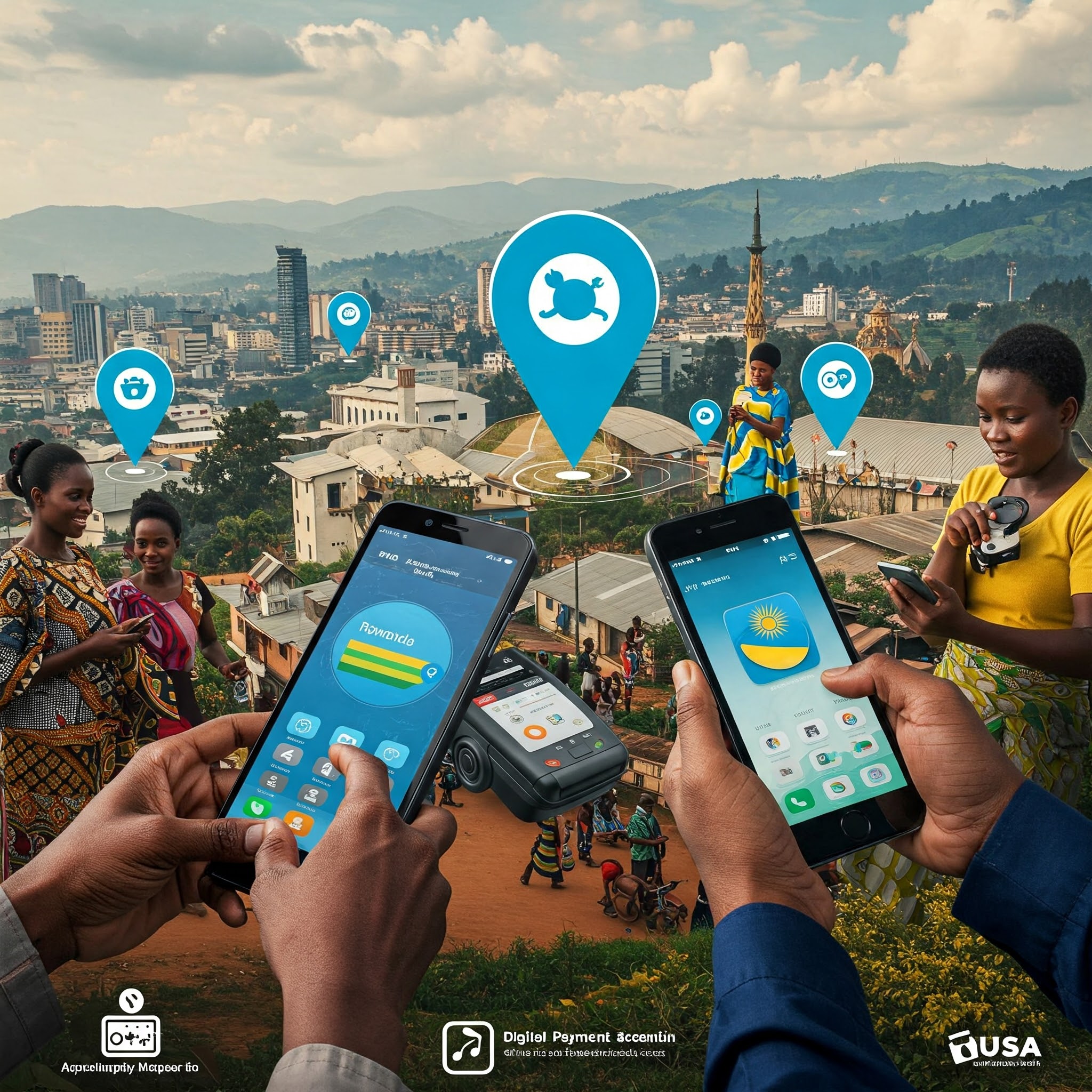Rwanda has emerged as one of Africa’s most dynamic digital payment markets, with impressive growth in transaction volumes and innovative solutions tailored to local needs. This comprehensive analysis explores the current state of Rwanda’s digital payment ecosystem in 2025, highlighting key players, regulatory developments, and emerging trends that are reshaping how businesses and consumers exchange value in the country.
Key Players in Rwanda’s Digital Payment Market
Mobile Money Providers
Mobile money services continue to dominate Rwanda’s digital payment landscape in 2025. MTN Mobile Money and Airtel Money maintain their positions as market leaders, with a combined market share of over 70%. The National Bank of Rwanda reports that mobile money accounts have reached 9.8 million users as of March 2025, representing an impressive 76% of the adult population.
Recent innovations from these providers include:
- Enhanced merchant payment systems using QR codes
- Interest-bearing mobile savings accounts
- Microloans and insurance products
- Cross-border payment capabilities within the East African Community
Banking and Card Services
Traditional banking institutions have accelerated their digital transformation efforts to remain competitive. Bank of Kigali leads with its integrated digital banking platform, offering seamless online transactions for both retail and corporate customers.
Visa and Mastercard have expanded their footprint in Rwanda through strategic partnerships with local banks, but card penetration remains relatively low at 15% compared to mobile money adoption. However, contactless payments are gaining traction in urban centers, particularly Kigali’s growing hospitality and retail sectors.
Fintech Disruptors
A new wave of fintech startups is challenging traditional payment models in Rwanda:
- Kasha – Pioneering confidential payment solutions for health and personal care products
- AC Group – Expanding its Tap&Go system beyond public transportation to retail payments
- Exuus – Revolutionizing community savings through blockchain technology
- Awesomity Lab – Creating custom payment solutions for SMEs
Regulatory Environment and Government Initiatives
The Rwandan government has maintained its position as a facilitator for digital payment innovation while ensuring consumer protection and financial stability. The National Bank of Rwanda implemented the revised Payment System Regulation in late 2024, addressing:
- Interoperability requirements between payment service providers
- Enhanced consumer protection and dispute resolution mechanisms
- Risk management standards for payment service providers
- Regulatory sandbox provisions for innovative payment solutions
The Rwanda Information Society Authority (RISA) has partnered with the private sector to increase digital literacy, helping more Rwandans confidently use digital payment solutions. Their Digital Ambassador Program has trained over 30,000 citizens in digital financial skills since its inception.
Market Trends and Consumer Behavior
Adoption Patterns
Digital payment adoption shows interesting demographic patterns across Rwanda:
- Urban centers like Kigali show near-universal adoption (94%)
- Rural areas have seen significant growth, with adoption rates reaching 64% in 2025
- Young adults (18-35) are the most active users across all platforms
- Women’s participation has increased dramatically, with gender parity achieved in mobile money account ownership
Most Popular Use Cases
According to our recent survey at Fosia Ltd, Rwandans primarily use digital payments for:
- Utility bill payments (88%)
- Person-to-person transfers (82%)
- Merchant payments (76%)
- Savings and investments (54%)
- Loan repayments (42%)
Consumer Challenges
Despite the progress, consumers still face several challenges:
- Network reliability issues in remote areas
- Transaction costs for smaller payments
- Digital literacy gaps, particularly among older users
- Security concerns and fraud awareness
Business Integration Opportunities
For businesses operating in Rwanda, integrating digital payment solutions offers significant advantages:
Small Businesses
Small businesses can leverage mobile money merchant accounts with minimal setup costs. Solutions like MTN MoMo Pay and Airtel Money Merchant allow businesses to accept payments with just a registered phone number and a QR code printout. The barrier to entry has never been lower, with transaction fees typically ranging from 0.5% to 1.5%.
Learn more about our SME digital payment solutions →
Medium-Sized Enterprises
For growing businesses with higher transaction volumes, payment aggregators offer more sophisticated solutions. Providers like Flutterwave and DPO Group enable integration with multiple payment methods through a single API, simplifying reconciliation and reducing integration complexity.
Enterprise Solutions
Large enterprises typically require customized payment ecosystems. Bank of Kigali and Equity Bank offer dedicated corporate payment gateways with features including:
- Multi-currency support
- Advanced reporting and analytics
- ERP system integration
- Automated reconciliation
- Enhanced security features
Regional Comparison
Rwanda’s digital payment ecosystem compares favorably with its East African neighbors:
| Country | Mobile Money Penetration | Card penetration | Fintech Innovation Index |
| Rwanda | 76% | 15% | 72/100 |
| Kenya | 83% | 18% | 81/100 |
| Tanzania | 65% | 8% | 58/100 |
| Uganda | 68% | 7% | 62/100 |
While Kenya maintains its leadership position in the region, Rwanda has closed the gap significantly in recent years, particularly in regulatory innovation and fintech startup activity.
Future Outlook
Several key developments are likely to shape Rwanda’s digital payment landscape in the coming years:
Central Bank Digital Currency
The National Bank of Rwanda’s pilot program for a Central Bank Digital Currency (CBDC) is scheduled for full implementation in Q3 2025, potentially revolutionizing the payment ecosystem with instant settlement and reduced transaction costs.
Open Banking Initiatives
The planned Open Banking Framework, currently in consultation phase, will enable secure data sharing between financial institutions, potentially unleashing a new wave of personalized financial services.
Cross-Border Integration
Rwanda’s participation in the Pan-African Payment and Settlement System (PAPSS) promises to reduce the cost and increase the speed of cross-border transactions, opening new opportunities for businesses with regional ambitions.
Biometric Authentication
Biometric payment authorization is gaining momentum, with several banks and fintechs piloting facial recognition and fingerprint verification to enhance security and convenience.
Conclusion
Rwanda’s digital payment ecosystem in 2025 represents a dynamic blend of established mobile money services, traditional banking innovations, and emerging fintech solutions. The regulatory environment continues to balance innovation with stability, while government initiatives promote wider adoption across demographic groups.
For businesses operating in Rwanda, understanding and leveraging the right digital payment solutions can significantly enhance customer experience, operational efficiency, and market reach. The convergence of high mobile penetration, supportive regulation, and innovative payment solutions creates fertile ground for digital commerce growth.
Contact Fosia Ltd to discover how we can help your business optimize its digital payment strategy in Rwanda’s evolving financial ecosystem.




